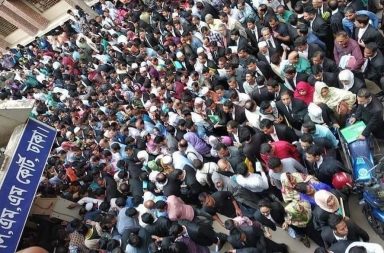By Aiman Rahman Khan
The Cabinet recently approved the draft of the Road Transportation Act 2017 of Bangladesh. In accordance with an order from the High Court Division, the new Act has been drafted in the light of the Motor Vehicles Ordinance 1983, but with some major changes. After several recent incidents of horrifying and tragic accidents on the road, the Government has taken a firm stand in a drive to curb unwanted road accidents.
The new draft stipulates the minimum educational qualification for driving license is now 8th grade, at least 18 years of age generally and 21 years of age for occupational drivers. In addition to that, the draft contains some other interesting provisions. The Act states one shall be liable to 3 months imprisonment and 35 thousand taka fine for driving motorbikes over footpath. Another provision, also the most interesting among others, states that, any person on a public transport, if allegedly sits or refuses to let others sit on a Ladies’ Seat shall be liable of 1 month imprisonment or a fine not more than 5 thousand taka or both. Whether such a strict liability is acceptable or not, is subject to debate and critical analysis.
What exactly is the Ladies’ Seat?
Female passengers enjoy a dedicated spot inside local buses of Dhaka. This used to be conventional until in 2008, Government ordered bus owners to dedicate 9 seats for women, children and persons with special needs. Generally, such seats on one side in a bus are reserved exclusively for women—meaning, if a man is seated on such a seat, a lady can ask him to vacate it for her. [1] But in reality, it is the exact opposite. A lady’s request is hardly taken by a male commuter sitting in the ladies’ seat. Although it is clearly written on the sides, many do not pay heed to it. The few reserved seats at the front often get occupied by males, leaving fellow women passengers standing. While many express decency in offering their seat, others rarely show any sign of sympathy. The seat capacity in almost all the buses is less than the number of passengers on board. A local bus in Dhaka roughly has 44 seats, a number which is beyond the general standard. More seats mean greater sale of tickets. These seats are customized by these transport owners to make use of space so that more passengers can be availed. Out of the 44, only 9 have been taken for women passengers. Still attraction lies on that specific part of the bus.
Commuter buses are so crowded that it becomes impossible for older people, women or children to obtain a seat inside a bus. Consequently, these vulnerable groups of people do not have access to bus services during rush hours.[2] On top of that there is a huge risk of sexual harassment in overcrowded buses of the capital. About 62% of female bus passengers said they faced various problems or harassment while travelling by buses. Sexual harassment of women in a crowded bus is a common problem in the capital city. [3]
Why is it needed?
According to a statistics by the Bangladesh Bureau of Statistics (BBS), there were about 18.3 million working women in 2015. Working women often require travelling by bus but it gets impossible at times due to the rush. The buses are so crowded that it becomes impossible for older people, women or children to obtain a seat inside a bus.[4] The women-only buses are negligible in amount which causes women to board on to the general ones. According to the Bangladesh Road Transport Corporation (BRTC), there are 17 woman friendly bus services which exist both in Dhaka (15) and Chittagong (2) and these are operated with a minimal number of commuters, without any profit.[5] The existing route of the ‘women only bus service’ covers the major university and the government offices. So, it is very difficult for women to travel in the city.[6]
Dedicating seats exclusively for the ladies is important because there is a need for it. Without them 80% of the time no women in our society will get a seat. In a society that push the idea that the needs of men should be put above the needs of women it is only natural that men would just occupy the seats and not bother in most cases to accommodate women.[7] There are several factors relating to why women need a separate seating arrangement.
- Often women carry babies with them and they may have trouble standing up for a long time.
- She faces sexual harassment or inappropriate touch standing in between man inside a crowded bus.
- Women are more sensitive than men. Men can climb up a running bus but most women may not do so.
- For women on their menstrual period, it is distressing to stand for a long time in summer time.
- Middle aged women often suffer from Osteoporosis and Arthritis.
- A girl falling asleep next to another girl on the reserved seat is safer than a girl falling asleep next to a man.
- The reserved seats are always at the front of the bus, closer to the driver’s, so that he may attend the passenger’s call for help.
- Then there are some practical problems like managing the outfit, multiple bags, hair, kids, high heels etc while standing. Sudden brakes and pothole jumps are inevitable.
Is it reasonable enough to impose 1 month imprisonment or a fine?
Inappropriate physical touch occurs despite having separate seats for women. Harassment takes place regularly. And what happens once it takes place. People turn a blind eye. The harassers go Scott free on their way to harass other passengers as they know are not likely to meet these women again and might continue to do so till one of them takes any action. [8] The question remains, is reserving seats the solution to these problems? Does a seat guarantee that you won’t be teased or groped? Or it just makes you comfortable in that crowded coach. Does a pervert think that this lady got a seat, and now I won’t harass any lady at all? [9] The idea of separate seats clashes with the principle of equality. The Road Transport Act 2017 have emphasized on the importance of the Ladies’ Seat due to the reasons mentioned above. But would imposing such a strict liability be any reasonable? Should a male passenger surrender his seat (willingly or unwillingly) to a woman who is as capable as him?[10]
Most public buses close their day’s service by 11.30pm in the city. The last of the passengers are mostly men and sometimes almost half of the bus is empty. The ladies’ seats remain vacant at these times. In these circumstances, any person may wish to sit in any seat that is empty, be it ladies’ or general ones. In the day time, many sick and unwell persons may travel by these overcrowded buses. Often they sit on the reserved female seats if they find them empty. Many a times, there are instances of women being downright rude to sick fellow male passengers just for a seat. Such an Act would not only be unfair to them but cause injustice to those who were unwilling to commit any offence. An aged person may sit on a women-only seat; he may refuse to get up as well. He might have not intended to carry out any unlawful act, but the Act would make him liable. The men traveling home from work late at night might have also violated the provision for sitting in the empty female seat.
The provision of the draft Road Transportation Act 2017 not only created a safer atmosphere for women but also upheld female rights. Women in a third world country do not have access to many luxuries of life. Making their traveling safe for their daily purpose must be given importance by any Government. Enactment of this Act would create a better commuting experience for females in Bangladesh. The liability enforced may seem unreasonable to many, especially due to the jail time one has to serve for just taking a seat. The Act is expected to strengthen the existing Government’s Order. It had already created awareness among those who do not think twice to break the law. It is further anticipated that such a law would instil a sense of discipline among male public transport commuters and the supremacy of law shall be maintained.
Aiman Rahman Khan is a Research Associate at Bangladesh Legal Aid and Services Trust (BLAST). He is currently pursuing his M.S.S with a major in Victimology and Restorative Justice from University of Dhaka. He completed his LLB from University of London and LL.M from Eastern University, Bangladesh.
References
[1] Phalswal A (2011), ‘The Ladies’ Seat. We have the reason to ask for one!’ [http://newsthatmattersnot.com/2011/05/the-ladies-seat-we-have-the-reason-to-ask-for-one.html]
[2]Mahmud A (2013), ‘Existing bus services not capable to meet commuter’s needs’, Dhaka Tribune [http://archive.dhakatribune.com/bangladesh/2013/oct/06/existing-bus-services-not-capable-meet-commuters%E2%80%99-need#sthash.BjZTRgSC.dpuf]
[3] Mahmud A (2013), ‘Existing bus services not capable to meet commuter’s needs’, Dhaka Tribune [http://archive.dhakatribune.com/bangladesh/2013/oct/06/existing-bus-services-not-capable-meet-commuters%E2%80%99-need#sthash.BjZTRgSC.dpuf]
[4] Mahmud A (2014), ‘Bus Commuters face endless hurdles’ Dhaka Tribune [http://archive.dhakatribune.com/bangladesh/2014/jan/20/bus-commuters-face-endless-hurdles]
[5] Jahan N (2016), ‘Everyday battle of Women Commuters’, The Daily Star [http://www.thedailystar.net/star-weekend/everyday-battle-women-commuters-1316401]
[6] Safeen (2008), ‘Transport Constraints’ [https://safeen.wordpress.com/2008/11/04/transport-constraints/]
[7] Crowly B (2013), ‘Gender Inequality: Why are there seats reserved for women in public transport buses, in India? and how is it fair?’, Quora, [https://www.quora.com/Gender-Inequality-Why-are-there-seats-reserved-for-women-in-public-transport-buses-in-India-and-how-is-it-fair]
[8] Madam Gupshup (2017), ‘Should Women get separate seats in Buses/Trains’ [http://members.makeupandbeauty.com/forums/topic/women-get-separate-seats-buses-trains/]
[9] Madam Gupshup (2017), ‘Should Women get separate seats in Buses/Trains’ [http://members.makeupandbeauty.com/forums/topic/women-get-separate-seats-buses-trains/]
[10] Rasam K (2015), ‘Should male passengers offer their seats to women on trains/buses?’, Quora [https://www.quora.com/Should-male-passengers-offer-their-seats-to-women-on-trains-buses/answer/Kavita-Rasam]



